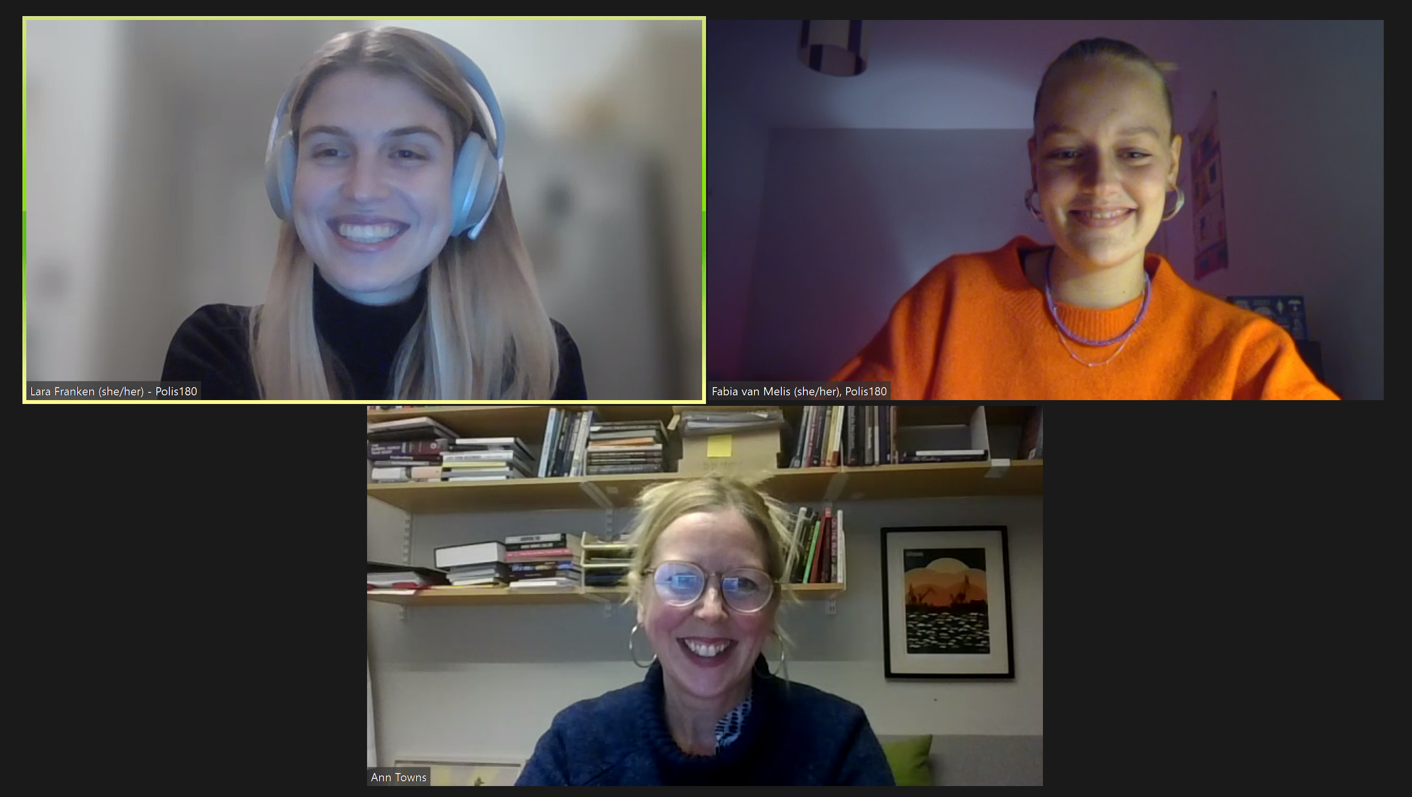by Fabia van Melis
On the 25th of October, the event series „Feminist Foreign Policy(s): An On-Going Journey through Global Policies„, organised by the programme Gender and International Politics, started. Under the topic “Revisiting Feminist Foreign Policy: Exploring Sweden’s Journey and the Power of the ‚F‘-Word”, we looked at the feminist foreign policy (FFP) of Sweden, which is a historical one – it was the first active FFP, and also the first to be abolished in 2022. We wanted to know what “feminist” in a foreign policy means, what lessons can be learned from Sweden’s experience and how these lessons can inform future approaches to advancing gender equality in foreign policy. To discuss these issues, Ann Towns joined us as the speaker.
Ann Towns is a professor of political science at the University of Gothenburg and a Wallenberg Academy Fellow. She directs the gender and diplomacy programme, with generous funding from the Knut and Alice Wallenberg Foundation, the Swedish Research Council and the Norwegian Research Council. Her work on diplomacy was awarded a Bertha Lutz Prize from the International Studies Association in 2018. Towns is author of “Women and States: Norms and Hierarchies in International Society” (2010, Cambridge University Press) and co-editor of “Gendering Diplomacy and International Negotiation” (2018, Palgrave) with Karin Aggestam. Her research also appeared in journals such as International Organization, European Journal of International Relations, International Studies Quarterly, Review of International Studies, Cooperation and Conflict and in many other venues. Furthermore, she is the main author of an extensive report on the implementation of the Swedish Feminist Foreign Policy, launched in fall of 2023.
Our discussion began with a comparison of Swedish foreign policy with and without a feminist focus. Towns illuminated how the foreign policy underwent significant transformation following the inception of the FFP in 2014, not only in the classical foreign policy realm but also for security, trade and development policy. Those areas had never been in touch with the term “gender equality” in swedish politics before. With the FFP, that changed: In every aspect of foreign policy, gender now had to be taken into account, and, in parts, this had a resemblance to a revolution. Thisdrew a lot of attention, not only in the country itself, but also from other countries. At the same time, tensions with the conservative parties increased. Interestingly, Towns mentioned that, only a quarter of the embassy staff used the term “feminism“ while most referred to“women’s rights” or “gender equality” instead, terms considered less polarising. The domestic feminist movements became “critical friends” at that time, as they did not always agree with all points of the policy while generally supporting it.
After the Swedish elections in 2022, a lot changed regarding the country’s foreign policy. Most notably, the new right-wing government abolished the FFP. Towns explained that gender equality can only be seriously addressed if it is monitored and results are demanded. Without an explicit FFP, however, this does not happen – the new government fundamentally rejects the concept of FFP. Additionally, events like Russia’s war of aggression or Sweden’s NATO accession are influencing and changing foreign policy priorities.
Regarding the key takeaways from Sweden’s FFP, she highlights three significant insights:
- Implementation matters. While the government may draft numerous plans on paper, the ultimate impact rests on diplomats in the field.
- An effective steering model is essential with guidlines. Transforming these plans into tangible outcomes necessitates clear directives and a practical framework that empowers officials within government bodies to enact these policies. Moreover, an evaluation of results becomes imperative: What goals have been attained, and what tangible transformations have occurred? Diplomats are not interested in discussing theories about the ”right“ kind of feminism, but rather wanted to know how to put it into practice
- Incorporating international law in the decision-making process is pivotal. Many decisions are affected by international legislation and soft law as for example the “Convention on the Elimination of All Forms of Discrimination Against Women” introduced by the United Nations in 1979. Therefore, it is important for think tanks to factor this aspect considerably more into their deliberative processes
The next question probed the specific research conducted regarding the cooperation with the government and the access to the data for Towns extensive report on the implementation of the Swedish FFP. Towns reported that the Swedish government itself was looking for a team to study the effects of a feminist foreign policy. She recommended collaborative research with the government as the most effective means to acquire substantial data on diplomats‘ actions and attitudes.
The final question broached the potential hazards of labeling foreign policy as „feminist“. Towns understood the concern – and raised the issue of “gender washing” and the risk that countries might appear more progressive than their actual practices are. She cited Mexico as an example. Furthermore, she recognised apprehensions about the policy’s potential binary gender focus. Nevertheless, she also defended the policy in this regard: According to her, introducing too many changes at once could lead to society being overloaded with issues. In practice the work was more intersectional than it might appear on paper.
This event was organised by Polis180’s programme Gender and International Politics and is part of the event series “Feminist Foreign Policy(s): An On-Going Journey through Global Policies”.
The Polis Blog serves as a platform at the disposal of ‘Polis180’s & ‘OpenTTN‘s members. Published comments express solely the ‘authors’ opinions and shall not be confounded with the opinions of the editors or of Polis180.
Fabia van Melis has been a member of Polis180 for about 2 years. She is studying Social Sciences at the Humboldt-University in Berlin with a special interest in foreign and security policy especially from a feminist perspective.
Event organization by Fabia van Melis, Lara Franken & Sophie Domres.
